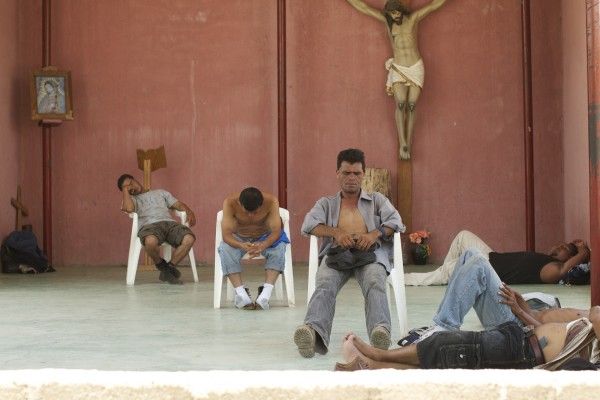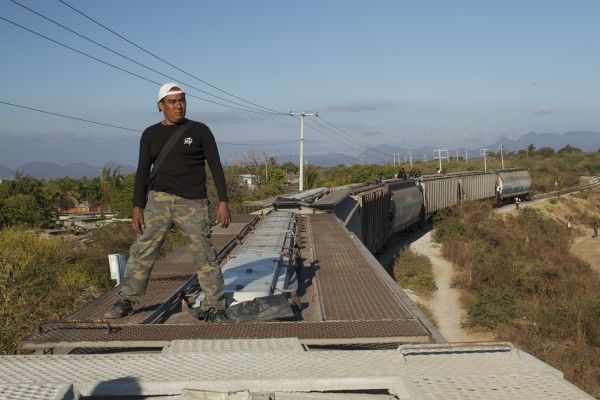We can accept poverty as long as it doesn't have a face, a name, a family, an identity. We know that illegal immigration is a "problem", and yet we often consider it a solution. It's a cheap workforce that does menial labor. We don't want them gone; we just don't want to look them in the eye because we know how they got here and how they're treated. We've thrown up a barrier both emotional and physical. Marc Silver and Gael Garcia Bernal attempt to tear down the physical wall by breaking down the emotional one. By exploring the life of a single immigrant who died trying to find a better life, Silver and Bernal have taken a fresh approach to a familiar issue. Their film only falters when they try to present a perfect face rather than a human one.
On August 3rd, 2010, a body was discovered in the Sonora Desert in Arizona. There was no clear identification on the corpse other than the name "Dayani Cristal" tattooed across his chest. From here, Silver takes us on two journeys that intersect at the mystery man's death. Silver goes inside the coroner's office where investigators try to uncover the identity of the dead man, and then the director flips back to a dramatization of the man's trip to the border by having Bernal play "Dayani Cristal". The personal journey of the dramatized "Dayani Cristal" walks us through the trip thousands upon thousands of Central Americans make to cross the border. The political journey takes us through the thousands of unnamed dead who never reached their destination. One talking head tells us that there have been 2000 deaths over the last 11 years in Southern Arizona. Expand that out to the entire U.S.-Mexico border, and we have a serious problem that goes beyond legality and into morality.
Silver's political argument is aggressive, but it doesn't feel overbearing because he and Bernal approach it from the interesting perspective of the thousands who die trying to cross the border. The familiar perspective is a legal one: they're not supposed to be here, they're undocumented, and so they practically have no identity. They're an invisible population we rely upon and yet dismiss. It's disturbingly callous to treat our fellow human beings this way, and by looking at their deaths, we're forced to examine the value of migrants' lives. The film forces us to recognize the irony of trying to identify the dead when Americans ignore these people in life.
What it lacks in a detailed political argument (Silver and Bernal have no answers other than demanding that we reform our failed immigration policy since tighter border controls are simply leading to more deaths), the film makes up for in humanizing the problem. When he's not speaking to investigators on the U.S. side, Silver interviews the family of "Dayani Cristal". We learn a little about his personality, but more importantly, we're reminded that there was a real life left behind. It's yet another way Silver hits home the point of forcing us to acknowledge the dehumanization of immigrants. This treatment of immigrants is not a new phenomenon nor is it a surprising one, but there is value in a powerful reminder.
Looking at "Dayani Cristal", his family, and his fellow migrant workers, Who Is Dayani Cristal? turns the political into something personal. But Silver and Bernal take it too far by trying to canonize these migrants. There is already something noble in people who risk their lives not for adventure or soul searching, but for the simple hope that they can one day have a better life for themselves and their families. And if they somehow reach their destination, then they can look forward to the grand prize of picking fruit, housekeeping, dishwashing, etc. To go so far for something we consider so unappealing is already powerful, but Silver and Bernal feel the need to gild the lily by casting the migrant as divine and heroic. Furthermore, by casting Bernal as "Dayani Cristal", the filmmakers further distance the audience from the problem by giving movie star looks to what should be an average person. The film never glamorizes the journey to cross the border, but it comes awfully close as Bernal rides atop a train and happily converses with his fellow immigrants.
The family and friends of "Dayani Cristal" say he had a positive personality, and perhaps that's what Silver and Bernal are trying to reflect, but it's not the right approach when trying to tackle a larger political issue. A political statement has no place in a eulogy, and Who Is Dayani Cristal? occasionally has trouble finding the middle ground. "Dayani Cristal" shouldn't be special, and when flimsy notions of the divine and the heroic are left aside, we can see his life and death as something far greater and also far more tragic. Silver effectively conveys his point that there are countless Dayani Cristals out there trying to cross the border. The filmmakers put a face on a serious problem, but that problem feels less serious when the face is too beautiful.
Rating: B
Click here for all of our Sundance 2013 schedule.



